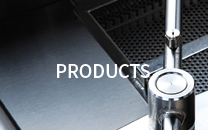Kitchen Hygiene
Description
Detergent solely for Dishwashers
- This special detergent not only washes and sterilizes dishes but also prevents—by forming an oil-layer inside—the formation of wastes inside dishwashers and prolongs the lifetime of washers.
SJM leads to maintain the kitchen environment safe and sanitary, with a variety of products in accordance with the materials of respective dishes and for the quality of water.
( SJM-30W, SJM-30DW, SJM-30WA, SJM-HW30, SJM-PMW30, SJM-35W, SJM-50W, SJM-50DW, SJM-50WA, SJM-HW50 )
Conditioners solely for Dishwashers
- With a superb drying effect by promoting a drying procedure, it is an eco-friendly detergent with a great economical value. It not only inhibits stains and the second contamination, in turn.
There are various types of products in accordance with the materials of respective dishes and for the quality of water.
(SJM-20R, SJM-10R, SJM-20R Gold, SJM-10R Gold, SJM-17R, SJM-20DR, SJM-10DR, SJM-HR20, SJM-HR10, SJM-PMR10 )
Oil Out
- A special detergent with a great cleansing power, readily removes oil stains, ground0in stains as well as carbon power. Also, it is great for washing other kitchen utensils made of stainless.
Powerful Detergent
- As a multi-purpose detergent for the kitchen, it is not only effective for cleaning all kitchen utensil(STS), floor, and the wall but also especially effective for sterilizing by boiling stainless food tray, spoons, etc.
Scale Remover
- If dishwashers are used for a long period of time, it is only natural to see a scale phenomenon since the melt-in magnesium and iron in water forms inside washers. It is a special detergent to readily remove such scale inside dishwashers.
Standard for cleaning products
Scope
- - “Detergent” hereby means such detergents that are used as the below purposes
- - Such detergents that are used for washing fruits and vegetables that could be eaten raw after washing
- - Such detergents that are used for washing dishes, bowls, and containers.
- - Such detergents that are used for washing utensils for cooking
Specifications
| Classification | Class1 | Class2 | Class3 |
|---|---|---|---|
| Specifications | Detergents for washing fruits or vegetables | Detergents for washing dishware (either for automated dishwashers or industrial dishware) |
Utensils for Cooking, Utensils for Processing foods |
| pH (Usage Concentration) | 6.0~10.5 | 6.0~10.5 (Dishware for auto-dishwasher and industrial use excluded) |
|
| Methyl Alcohol (Solid, Powder, Granule excluded) | below 1mg/g | below 1mg/g | |
| Arsenic (Usage Concentration) | below 0.05ppm | below 0.05ppm | below 0.4ppm |
| Heavy Metals (Usage Concentration) | below 1ppm | below 1ppm | below 2ppm |
| Fluorescent Whitening Agent | Non-detected | Non-detected | Non-detected |
| Recommended Dosage for Use:
Unless the dosage is not indicated or the dosage is different depending dishware types, |
|||
Usage Standards
- - With the class 1 detergent, do not soak fruits or vegetables in the solution more than 5 minutes.
- - With the class 1 detergent, make sure to rinse once again with drinkable water, after washing fruits or dishware with the solution. When washing with running water, rinse fruits or vegetables more than 30 seconds, and 5 seconds for dishware.
When washing with contained water, rinse more than twice with renewed water. - - With the class 2 and 3, make sure to rinse with drinkable water to wash off the residues of detergents on utensils, etc..
- - With the class 2 and 3, do not use it other than the sole purposes or more than the indicated dosage.
- - The detergent of class 1 can be used for the purposes of class 2 usage, and 2 for 3 but NOT the other way around.
- - Class 2 industrial dishware means the ones that are used for the businesses with a regular kitchen or for institutional food services.


